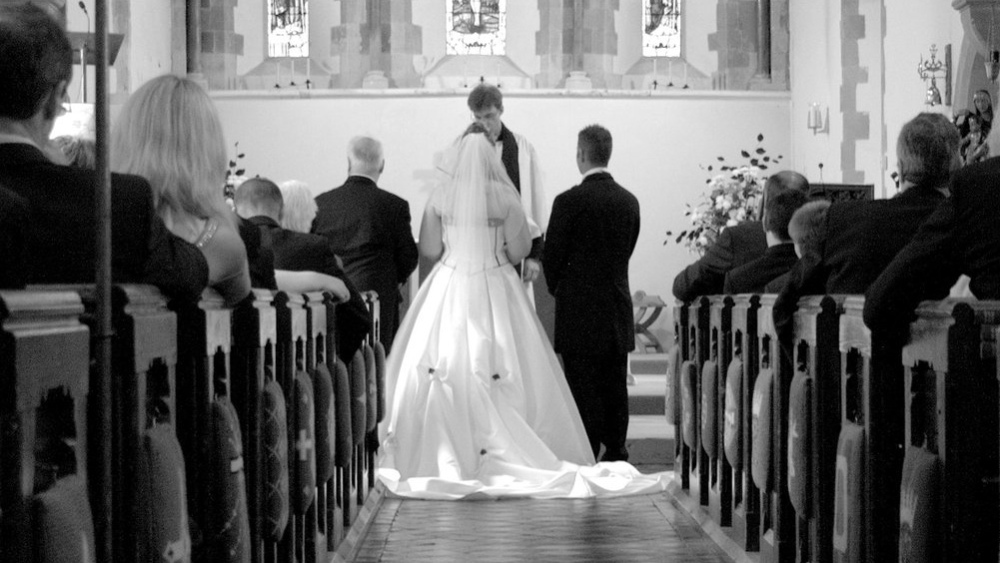Seventy percent of Australian wedding ceremonies are conducted by civil celebrants, according to the latest data from Australian Bureau of Statistics.
The data, which lists October as the most popular month for Australians to tie the knot, shows marriage is on the increase, with a record numbers exceeding 121,000 marriages per year.
But while marriage numbers have been on the increase for over a decade, the last time religious celebrants officiated more ceremonies than civil celebrants was in the 1990s.
“With church attendance declining, the one time Australians were likely to pass through the church doors was for a wedding, but now just 30 per cent of all weddings are conducted by ministers of religion,” says social researcher Mark McCrindle.
Australia sees an average of 332 weddings per day, with this figure rising to an average of 577 in October, the busiest month of the year, and down to 190 in June, the quietest month of the year.
Rev Bruce Johnson from St Andrew’s Uniting Church in Brisbane says the number of weddings conducted at his church are less than what they have been in the past. Yet they still have non-churchgoers come to be married at St Andrews.
“Some come to St Andrews because there’s some family connection with the church. Some people come because they want a traditional style of wedding in a heritage building.”
“The answers I get include ‘because we like the church building’ and also for many couples there’s some sense that it’s the right thing to do. Some sense that there’s a God somewhere who has something to do with this; there’s a residual sense of religious significance.”
As to the ‘religious’ nature of a wedding service held in a church, Johnson says that he has never had any couples who reject the ‘religious’ elements of the service. “Even those couples with no real church connections still want certain Bible passages they want to use.”
Richard James is the wedding minister at St Thomas’ Anglican Church in North Sydney. He says, to his knowledge, he is the only minister in Australia whose job is to only look after weddings, fully funded by the fees charged to be married at the church ($2500 per couple). He’s kept pretty busy, conducting an average of 65 weddings a year, and over 200 since he took on the role three years ago.
Richard says he’s not surprised by the ABS statistics, though he’s still receiving hundreds of requests by non-churchgoers to get married at St Thomas’. In fact, Richard only marries non-Christians. He calls himself a “wedding evangelist.”
“I started this ministry specifically as an outreach to non-churchgoers. So when Christians from other churches call and say they want to get married here, I turn them away. I could have hundreds of Christians getting married here, but if we accommodate them, we’d have no room for the non-Christians.”
Richard argues that church weddings may be decreasing because when they do happen, many churches aren’t doing them properly, nor are they taking advantage of the evangelistic opportunities that arise from often hundreds of guests from outside the church arriving on their doorstep.
“We get 100 guests on average to every wedding we conduct, so with 200 weddings I’ve done in three years, that’s 20,000 people who could hear the gospel if it’s preached at the service,” says Richard.
Richard also believes that churches aren’t making it easy enough for couples to find them when it comes time to look for a ceremony venue.
“I’ve met with lots of churches who have beautiful buildings for weddings, but their websites are hopeless. No one can find them or the information about what’s involved in holding a wedding at their church. One of the reasons people aren’t getting married in churches is that we’re not helping them.”
Being a specifically wedding-oriented minister means Richard is able to spend quality time – up to 40 hours – with each couple he marries. That time includes a five-week (two hours a week) marriage preparation course at his home with Richard and his wife and a six week course that’s been adapted from Christianity explained. He is running another study with six couples who’ve been through his pre-marriage courses and have been keen to learn more about Christianity.
“That’s my plan, to see these couples come to Christ. I’m praying they’ll be reborn.”

